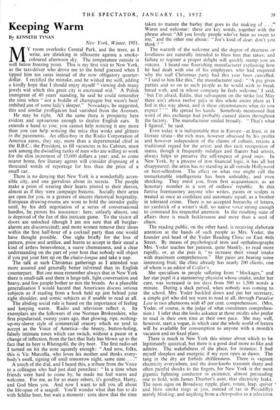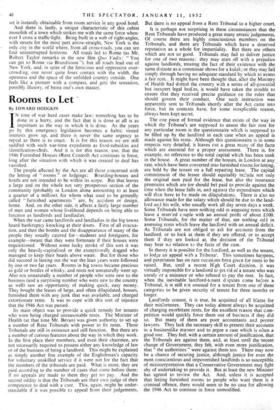Keeping Warm
By KENNETH TYNAN New York, Winter, 1951.
MY room overlooks Central Park, and the trees, as I write, are shrieking in silhouette against a smoke- coloured afternoon sky. The temperature outside is well below freezing point. This is my first visit to New York, as the taxi-driver who drove me to the hotel guessed when I tipped him ten cents instead of the now obligatory quarter- dollar. I rectified the mistake, and he wished me well, adding a kindly hope that I should enjoy myself "viewing duh many jewels wid which this great city is encrusted wid." A Polish immigrant of 40 years' standing, he said he could remember the time when "not a boddle of champagne but wasn't bein' imbibed ,put of some lady's sleeper." Nowadays, he suggested, this and similar profligacies had vanished from the Avenues.
He may be right. All the same there is prosperity here evident and uproarious enough to deafen English ears. It extends a hand to you; you cannot help noticing it any more than you can help noticing the mica that winks and glitters in the pavements. An office-boy in the Radio Corporation of America earns, they say, more than a departmental chief in the B.B.C.; the President, to fill vacancies in his Cabinet, must seek among the dwindling ranks of men who are willing to work for the slim increment of 15,000 dollars a year; and, to come nearer home, few literary agents will consider disposing of a thousand words of reportage for less than the price of a small car.
There is no denying that New York is a wonderfully acces- sible city, and one garrulous about its secrets. The people make a point of wearing their hearts pinned to their sleeves, almost as if they were campaign buttons. Socially their arms are open for you, in a gesture of sincere rhetorical hospitality. European drawing-rooms are wont to hold the intruder guilty until, by his deft negotiation of a series of conversational hurdles, he proves his innocence: here, unfairly almost, one is deprived of the fun of this intricate game. To the visitor all doors are unlocked (though I am not sure that all burglar- alarms are disconnected); and more women remove their shoes within the first half-hour of a cocktail party than one would have thought possible. One sighs briefly for the loss of pattern, poise and artifice, and learns to accept in their stead a kind of artless benevolence, a suave chumminess, and a clear understanding on the part of your host that nobody will object if you put your feet up on the chaise-longue and take a nap.
The talk at such Christmas gatherings as I attended was more assured and generally, better informed than its English counterpart. But one must remember always that in New York there is small-talk and there is large-talk, light conversation and heavy, and few people bother to mix the breeds. As a plausible generalisation I would hazard that Americans discuss serious subjects as if reading from a book held up just behind your right shoulder, and comic subjects as if unable to read at all.
The abiding social rule is based on the importance of feeling and keeping warm. Radio and television reflect it. Its exemplars are the followers of one Norman Brokenshire, who first popularised, twenty years ago, that glowing, ripe, nothing- up-my-sleeve style of commercial oratory which we tend to accept as the Voice of America—the breezy, button-holing, falsely intimate tones which can switch, without a pause or a change of inflection, from the fact that Italy has blown up to the fact that its beer is Rheingold, the dry beer. The first radio-set I turned on hit the note squarely enough: "And now, folks, this is Vic Marcella, who loves his mother and thinks every- body's swell, signing off until tomorrow night, same time . . ."
A touch of the dial, and I heard this, a tribute from the Voice to a colleague who had just died penniless : "In a time when friends were hard to come by, he made me feel warm and welcome. For me, as for so many others, it's goodbye, Harry, and God bless you. And now I want to tell you all about the life-span of a seagull. You'll wonder what that has to do with Schlitz beer, but wait a moment: tests show that the time taken to mature the barley that goes to the making of . . ." Warm and welcome: these are key words, together with the phrase about "All you lovely people who've been so sweet to me," and the other one about: "Joe's kind of dear, don't you think?"
The warmth of the welcome and the degree of dearness or loveliness are naturally intended to bless him that takes; and failure to register a proper delight will quickly stamp you an outcast. I heard one flourishing manufacturer explaining how he had dealt with one of his employees, who had enquired why the staff Christmas party had this year been cancelled.
"I said to him like this," the manufacturer said : "'A guy gives parties and so on to such people as he would wish to break bread with, and in whose company he feels welcome,' I said, 'but I'm afraid, Eddie, that subsequent on the strike last May there ain't above twelve guys in this whole entire plant as I feel in this way about, and in these circumstances what do you expect ? ' " He spread his hands. Somebody mentioned that word of this exchange had probably caused alarm throughout the factory. The manufacturer smiled broadly. " That's what I figured," he said.
Even today it is indisputable that in Europe—at least, in its literate strata—the rich man, however obsessed by his profits and however independent of the claims of culture, retains a traditional regard for the artist; and this tacit recognition of status, though it frequently indulges and flatters bad artists, always helps to preserve the self-respect of good ones. In New York, by a process of iron financial logic, it has all but disappeared; the artist has no standing at all outside Hollywood or best-sellerdom. The effect on what one might call the unmarketable intelligentsia has been unhealthy, and even shocking. They enrol you, from first acquaintance, as an honorary member in a sort of outlaws' republic. In this furtive freemasonry anyone who writes, paints or sculpts is treated at once as confidant and automatic equal; as a brother in tolerated crime. There is no accepted hierarchy of letters, no yardstick of a writer's skill, no native voice strong enough to command his respectful attention. In the resulting state of affairs there is much fecklessness and more than a seed of chaos.
The reading public, on the other hand, is receiving elaborate attention at the hands of such people as Mrs. Yoder, the founder and head of the Yoder Reading Clinic on East 46th Street. By means of psychological tests and opthalmographs Mrs. Yoder teaches her patients, quite blankly, to read more rapidly, or, as she puts it, "to increase their visual intake with maximum comprehension." Her pains are hearing some interesting fruit; the clinic already has nearly 200 clients, one of whom is an editor of Collier's.
She specialises in people suffering from "blockages," and her star pupil is a stammering physicist whose intake, under her care, was increased in ten days from 500 to 1,500 words a minute. During a slack period, when nobody was coming to the school, Mrs. Yoder buckled down and put her secretary, a simple girl who did not want to read at all, through Paradise Lost in two afternoons with 45 per cent. comprehension. (Mrs. Yoder, of course, is the judge of what constitutes comprehen- sion.) I infer that she looks askance at those misfits who prefer to read in their own time at their own pace. She may well, however, start a vogue, in which case the whole world of letters will be available for consumption to anyone with a month's vacation and no fixed plans.
There is much in New York this winter about which to be legitimately quizzical, but there is a‘good deal more to like and admire. The wakefulness of the place, for instance; 'I find myself sleepless and energetic if my eyes open at dawn. The tang in the dry air forbids shiftlessness. There is vagrant electricity everywhere, and the door-knobs transmit sharp and often painful shocks to the fingers, for New York is the most gigantic lightning conductor in existence, almost persuading one to hold, with James Thurber's aunt, that electricity leaks. The neon signs on Broadway ripple, glare, rotate, leap, quiver • and blow smoke rings at you, instead of (as in Piccadilly) merely blinking; and anything from a chiropodist to a television set is instantly obtainable from room service in any good hotel.
And there is, lastly, a unique characteristic of this cubist monolith of a town which strikes me with the same force when- ever I cross a traffic-light. Being built in a web of right-angles, with streets for the most part arrow-straight, New York is the only city in the world where, from all cross-roads, you can see four uninterrupted horizons. All roads led to Rome (as Mr. Robert Taylor remarks- in the new film Quo Vadis: "You can get to Rome via Brundisium "), but all roads lead out of New York, and, in spite of the ferocious and oppressive over- crowding, one never quite loses contact with the width, the openness and the space of the unfolded country outside. One feels like a pioneer with a compass, and gets the sensation, possibly illusory, of being one's own master.



































 Previous page
Previous page